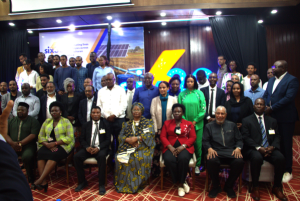Campaigners, led by former Malawian president Dr Joyce Banda, have called for urgent and massive investments in renewable energy access to provide electricity to millions in sub-Saharan Africa – as the world enters the last five years of the Sustainable Development Goals (SDG).

Around 630 million people in the region lack electricity, and almost a billion still use solid biomass for cooking and heating, making Sub-Saharan Africa the most energy-impoverished part of the world.
The absence of modern energy services perpetuates poverty, limits economic opportunities, affects overall well-being and heightens climate change vulnerability, especially among women and young girls, said Dr Banda, who launched the campaign dubbed Six30 in Addis Ababa, Ethiopia, on Monday, April 22, 2024.
Multiple factors account for the low access to sustainable energy services, but all are linked to or exacerbated by a lack of substantial and adequate financing. Despite one of the highest potentials for renewable energy, the region receives only 2% of global investments.
The Six30 Campaign is an ambitious initiative to spur public and private donors in and out of Africa to substantially increase funding and investments for renewable energy projects across the continent that prioritise access.
Driven by the African Coalition for Sustainable Energy and Access (ACSEA), the Pan-African Climate Justice Alliance (PACJA), and several other partners, the campaign will run from 2024 to 2030, coinciding with the end of the SDGs.
The goal is to spur investments upwards of $630 billion to bring electricity to 630 million people in Sub-Saharan Africa by 2030, in line with the Sustainable Development Goals (SDGs), the Paris Agreement and Africa Agenda 2063.
Dr Agustine Njamnshi, executive director of ACSEA, said bridging the energy gap in Sub-Saharan Africa is crucial for promoting broader socio-economic development and tackling climate change.
“Energy poverty is not just a material problem; it’s a silent crisis that suffocates hope and stifles human potential,” he said. “The Six30 Campaign is much more than a mere initiative. It is a rallying cry, a call to action, a symbol of hope for millions living in darkness. Together, we can reach unprecedented heights. Together, we can transform lives and build a future without anyone being left behind. We can achieve the impossible through solidarity and determination and push back the boundaries of injustice and deprivation.”
Dr Mithika Mwenda, Executive Director of PACJA, said the Six30 Campaign calls for a global partnership to address Africa’s current energy access crisis.
“This campaign is a call to action for international cooperation and solidarity. It is a call to all nations, all organisations and all individuals who believe in a sustainable and equitable future,” he said.
Leaders from the region have welcomed the campaign, which comes amid a growing consensus that energy access is an “immediate and absolute priority” for the region.
“The Six30 campaign is timely,” said Jaqueline Amongin, member of parliament of Uganda and the East African Legislative Assembly, citing the scale of the problem in Uganda, where roughly 55% of the population has no electricity. “There can be no better time to launch such an initiative.”
